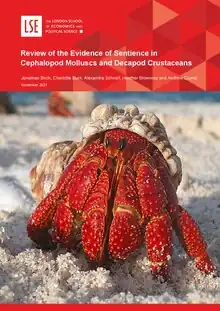Jonathan Birch (philosopher)
Jonathan Birch is a British philosopher who is an Associate Professor in the Department of Philosophy Logic and Scientific Method at the London School of Economics and Political Science. His work addresses the philosophy of biology, especially questions around the evolution of social behaviour and social norms, animal sentience, and animal welfare.[1]

Career
Birch read for a BA (Hons) in Natural Sciences at the University of Cambridge from 2005 to 2008, and then an MPhil in History and Philosophy of Science at Cambridge from 2008 to 2009.[2] He read for a PhD in the Philosophy of Science at Cambridge from 2009 to 2013.[2] His thesis, which was supervised by Tim Lewens, was entitled Kin Selection: A Philosophical Analysis.[3] From 2012 to 2014, Birch held a Junior Research Fellowship at Christ's College, Cambridge.[2] He was awarded a Philip Leverhulme Prize in 2014.[4]
Birch took up an Assistant Professorship at the Department of Philosophy Logic and Scientific Method at the London School of Economics and Political Science (LSE) in 2014.[2][1] In 2017, he published his monograph The Philosophy of Social Evolution with Oxford University Press. The book explores the philosophical foundations of social evolution theory, as founded by W. D. Hamilton, including Hamilton's rule, kin selection, and inclusive fitness. Birch makes the case that social evolution theory offers potential for furthering understanding of a range of areas of evolutionary science, including microbial evolution and human evolution, as well as in diverse studies of cooperation.[5] In 2018, Birch was promoted to Associate Professor.[2]
From 2020, Birch was the principal investigator for the five-year Foundations of Animal Sentience (ASENT) research project at LSE, which was funded by the European Research Council. Responding to controversies around the nature and attribution of animal sentience, the project seeks to develop "a conceptual framework for thinking about sentience as an evolved phenomenon that varies along several dimensions, a deeper understanding of how these dimensions of sentience relate to measurable aspects of animal behaviour and the nervous system, and a richer picture of the links between sentience, welfare and the ethical status of animals".[6]
Birch was the lead author of a report entitled Review of the Evidence of Sentience in Cephalopod Molluscs and Decapod Crustaceans for the Department for Environment, Food and Rural Affairs, published in 2021. The report recommended that cephalopods and decapod crustaceans should be considered sentient under the Animal Welfare Act 2006 and other UK laws.[7] The Animal Welfare (Sentience) Act 2022, when initially drafted in 2021, recognised only vertebrates as sentient. In response to Birch's report, however, the Act was amended to include cephalopods and decapods.[8]
Selected publications
- Birch, Jonathan; Okasha, Samir (2014). "Kin selection and its critics". BioScience. 65 (2): 22–32. doi:10.1093/biosci/biu196.
- Birch, Jonathan (2017). "Animal sentience and the precautionary principle". Animal Sentience. 16 (1). doi:10.51291/2377-7478.1200. S2CID 37538020.
- Birch, Jonathan (2017). "The inclusive fitness controversy: Finding a way forward". Royal Society Open Science. 4 (7) 170335: 170335. Bibcode:2017RSOS....470335B. doi:10.1098/rsos.170335. PMC 5541557. PMID 28791162.
- Birch, Jonathan; Schnell, Alexandra K.; Clayton, Nicola S. (2020). "Dimensions of animal consciousness". Trends in Cognitive Sciences. 24 (10): 789–801. doi:10.1016/j.tics.2020.07.007. PMC 7116194. PMID 32830051.
- Birch, Jonathan (2017). The Philosophy of Social Evolution. Oxford: Oxford University Press. doi:10.1093/oso/9780198733058.001.0001. ISBN 978-0-19-873305-8.
- Birch, Jonathan; Burn, Charlotte; Schnell, Alexandra; Browning, Heather; Crump, Andrew (November 2021). Review of the Evidence of Sentience in Cephalopod Molluscs and Decapod Crustaceans (Report). London School of Economics.
- Browning, Heather; Birch, Jonathan (2022). "Animal sentience". Philosophy Compass. 17 (5) e12822: e12822. doi:10.1111/phc3.12822. PMC 9285591. PMID 35859762.
References
- "Dr Jonathan Birch". London School of Economics. Retrieved 17 July 2023.
- Birch, Jonathan (2022). "CV" (PDF). London School of Economics. Retrieved 17 July 2023.
- Birch, Jonathan (2013). Kin Selection: A Philosophical Analysis (PDF) (Thesis). University of Cambridge.
- "Philip Leverhulme Prizes 2014". Leverhulme Trust. Retrieved 17 July 2023.
- Reviews:
- Brusse, Carl; Sterelny, Kim (27 August 2019). "The Philosophy of Social Evolution". BJPS Review of Books. Retrieved 17 July 2023.
- Rubin, Hannah (2019). "The Philosophy of Social Evolution". Economics & Philosophy. 35 (2): 354–60. doi:10.1017/s0266267119000051. S2CID 159297827.
- Ruse, Michael (2018). "The Philosophy of Social Evolution". The Quarterly Review of Biology. 93 (2): 152–3. doi:10.1086/698062. S2CID 90707790.
- Shavit, Ayelet (2019). "Jonathan Birch, The Philosophy of Social Evolution". History and Philosophy of the Life Sciences. 41 (1) 3. doi:10.1007/s40656-019-0240-7. S2CID 73430279.
- Ågren, J. Arvid (2018). "The Hamiltonian view of social evolution" (PDF). Studies in History and Philosophy of Science Part C: Studies in History and Philosophy of Biological and Biomedical Sciences. 68–69: 88–93. doi:10.1016/j.shpsc.2018.05.005.
- Thrasher, John (2018). "The price of sociality". Metascience. 28: 139–142. doi:10.1007/s11016-018-0355-6. S2CID 254790929.
- Huneman, Philippe (2020). "Essay Review: Exploring the Conceptual Foundations of Post-Hamiltonian Evolutionary Biology—Rationality and Evolution of Social Agents" (PDF). Acta Biotheoretica. 68 (4): 453–467. doi:10.1007/s10441-020-09380-1. S2CID 254183465.
- "Foundations of Animal Sentience (ASENT)". London School of Economics. Retrieved 22 July 2023.
- Birch, Jonathan; Burn, Charlotte; Schnell, Alexandra; Browning, Heather; Crump, Andrew (November 2021). Review of the Evidence of Sentience in Cephalopod Molluscs and Decapod Crustaceans (Report). London School of Economics. Retrieved 22 July 2023.
- Commentary:
- "UK Sentience Bill passes final stages to recognise decapod and cephalopod sentience by law". Eurogroup for Animals. 8 April 2022. Retrieved 22 July 2023.
- Rowan, Andrew N.; D'Silva, Joyce M.; Duncan, Ian J. H.; Palmer, Nicholas (2021). "Animal sentience: History, science, and politics". Animal Sentience. 31 (1). doi:10.51291/2377-7478.1697. S2CID 248791711.
- Wickens, S. (2023). "Review of the evidence of sentience in cephalopod molluscs and decapod crustaceans". Animal Welfare. 31 (1): 155–156. doi:10.1017/S0962728600009866. S2CID 255676202.
- Aridi, Rasha (21 November 2021). "Lobsters, Crabs and Octopuses Will Now Receive Welfare Protection as 'Sentient Beings' in the U.K." Smithsonian Magazine. Retrieved 26 July 2023.